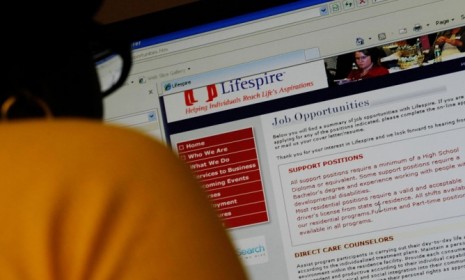Will wages ever bounce back?
Pay rates in the U.S. have dropped more during this recession than in any downturn since the Great Depression. How long will the pain last, and can the government do anything to help?

A free daily email with the biggest news stories of the day – and the best features from TheWeek.com
You are now subscribed
Your newsletter sign-up was successful
Wage declines are the new reality for the American workforce. More than half the full-time employees who lost jobs between 2007 and 2009 and have since found new full-time positions reported a wage cut, according to the Labor Department. More than one third (36 percent) said wages in the new job were at least 20 percent lower than in the one they lost. Americans haven't seen such large pay cuts since the Great Depression, reports Sudeep Reddy in The Wall Street Journal. Can anything be done about them? (See how some New Yorkers are protesting)
The wage cuts will prolong the downturn: This isn't "surprising" news, says Daniel Indiviglio in The Atlantic. In this recession, unlike many others, "good, high-paying jobs were lost." Unfortunately, this steep decline in wages signals that "overeducated, overqualified workers are taking jobs below their experience levels." This will only prolong unemployment rates among those with "less education and relatively weaker experience levels."
"Why did the recession cause a big drop in wages?"
The Week
Escape your echo chamber. Get the facts behind the news, plus analysis from multiple perspectives.

Sign up for The Week's Free Newsletters
From our morning news briefing to a weekly Good News Newsletter, get the best of The Week delivered directly to your inbox.
From our morning news briefing to a weekly Good News Newsletter, get the best of The Week delivered directly to your inbox.
There is a silver lining, though: This news "may not be quite as bad as it sounds," says Ed Morrissey in Hot Air. As wages fall, so do prices, "especially in real estate." If declining wages erode the price of housing, food, and energy, that's good news for those struggling to get by. But until the Obama administration stimulates "job-creating growth," things are unlikely to change.
"Wage cuts steepest since the Depression?"
Wage insurance might help: The "real and permanent loss of income" suffered by many during this recession may spur more talk of "wage insurance," says James Pethokoukis at Reuters. That's when the government makes up the shortfall in wages for laid-off workers who find new, lower-paying jobs in the same field. Obama's new top economic adviser, Gene Sperling, is known to be a fan of the policy, and John McCain suggested it during the 2008 elections. But it would be "very expensive."
"The Great Wage Drop and wage insurance"
A free daily email with the biggest news stories of the day – and the best features from TheWeek.com
-
 The ‘ravenous’ demand for Cornish minerals
The ‘ravenous’ demand for Cornish mineralsUnder the Radar Growing need for critical minerals to power tech has intensified ‘appetite’ for lithium, which could be a ‘huge boon’ for local economy
-
 Why are election experts taking Trump’s midterm threats seriously?
Why are election experts taking Trump’s midterm threats seriously?IN THE SPOTLIGHT As the president muses about polling place deployments and a centralized electoral system aimed at one-party control, lawmakers are taking this administration at its word
-
 ‘Restaurateurs have become millionaires’
‘Restaurateurs have become millionaires’Instant Opinion Opinion, comment and editorials of the day